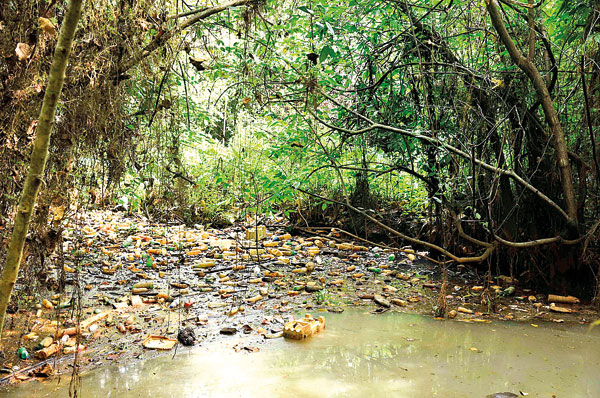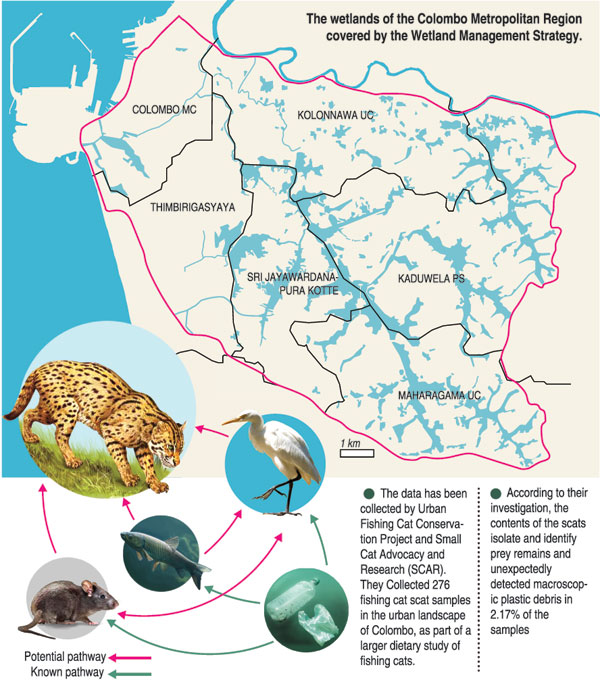News
Microplastic pollution increases risks for urban fishing cats
View(s): 400By Yoshitha Perera
Plastic pollution in freshwater habitats endangers not only the species at the base of the food chain, but also those at the top.
Fishing cats, one of the four species of wild cat, is closely associated with marshes, wetlands, and other areas with running water. They can also be seen in urban wetlands.
Wetlands in the urban metropolitan area are vulnerable to plastic pollution, while the extent of contamination in the fauna is not widely known.

Anya Ratnayaka
According to a recent scientific study, some land and freshwater habitats in the country may have higher plastic pollution levels than those seen in marine areas.
The study was done by conservation biologist Anya Ratnayaka and the co-authors were Laurel Serieys from Panthera, the United States, Therangika A Hangawatte from Small Cat Advocacy and Research (SCAR), Dr Luke Leung from School of Agriculture and Food Science, Australia and Dr Diana Fisher from School of Biological Science, University of Queensland, Australia.
They found fishing cats absorbed plastic, and there is a trophic transfer to urban wetlands.
“Fishing cats are predators and ambush hunters; they are not going to garbage dumps. As far as current research shows, they are not visiting garbage dumps and eating garbage out of them,” she said.
According to Ms Ratnayaka, there is a trophic transfer, which means that cats are consuming prey polluted with plastic.
The data has been collected by Urban Fishing Cat Conservation Project and SCAR. They collected 276 fishing cat scat samples in the urban areas of Colombo, as part of a larger dietary study of fishing cats. According to their investigation, the contents of the scats isolate and identify prey remains and unexpectedly detected macroscopic plastic debris in 2.17% of the samples.
“Although macroscopic plastic detection was low, our findings suggest that accumulation of plastics is occurring in wetland food webs, and plastic pollution in freshwater terrestrial systems could pose a risk to predators that do not directly consume,” Ms Ratnayaka said.
Fishing cats are an endangered species in the International Union for Conservation of Nature (IUCN) ratings.
“Everything we found, anything we published, we shared it with the Urban Development Authority (UDA) and Sri Lanka Land Development Corporation (SLLDC). Apart from research, we are also trying to come up with mitigation measures,” she said.
With the plastic contamination in freshwater bodies, the Urban Fishing Cat Conservation Project is trying to come up with some mitigation measures.

A stream of muck: Wetlands are vulnerable to plastic pollution (Pix by Akila Jayawardena)
“We can’t stop people from using plastics completely but we are trying to take measures to make people aware of how to reduce it. We are aiming to reduce the amount of plastics that are coming into freshwater systems. This is our plan for 2023,” Ms Ratnayaka explained.
Ms Ratnayaka said the fishing cats are difficult animals to count because they are extremely secretive. “In this particular Beddagana Wetland Park we have about four fishing cats that we have seen; but we assume that there could be more,” she said.
Plastic pollution, habitat loss, and climate change all play major roles in the alteration of the world’s ecosystems, with plastic pollution increasingly being detected in the world’s most remote corners. The majority of studies on environmental plastic contamination are done in marine environments.
“87% of studies on plastic pollution and its effects on wildlife have taken place in marine systems, while only 13% have taken place in freshwater environments,” Ms Ratnayake noted.
In response to concerns about plastic contamination in freshwater bodies and wetlands, Dr N S Wijayaratne, deputy general manager, wetland management, SLDCC, said: “We have already set up a barrier to contain the floating garbage. But there is no way to capture plastic that dissolves in water. This is the riskiest part.
“We didn’t talk about wetlands in 1950; all we wanted was a green Colombo. However, due to the loss of wetland habitats and the relocation of cities into wetland areas, authorities’ eyes have been opened to the importance of wetlands conservation.’’ He said this is also due to an increase in floods caused by the loss of wetland areas.
“To prevent encroachment, we have launched a programme on the wise use of wetlands. We are not preventing people from entering wetland areas, but they are not permitted to build illegal structures,” he said.

The best way to say that you found the home of your dreams is by finding it on Hitad.lk. We have listings for apartments for sale or rent in Sri Lanka, no matter what locale you're looking for! Whether you live in Colombo, Galle, Kandy, Matara, Jaffna and more - we've got them all!

